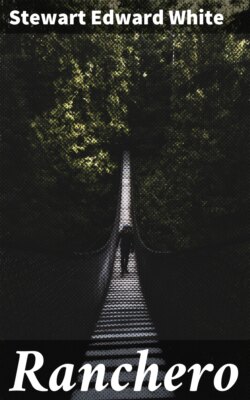Читать книгу Ranchero - Stewart Edward White - Страница 7
На сайте Литреса книга снята с продажи.
CHAPTER I
The Lovely Land
ОглавлениеTable of Contents
Andy Burnett reached California in the autumn of 1832. It is impossible to say exactly where he and his three horses crossed the Sierras. He may have found his way past what is now called Donner Lake and so over the summit and down the American River; or, more probably, he may have picked a route farther north. Andy was an old-time mountain man, of ten years’ experience in the Rockies, and a range of mountains more or less presented to him, at this time of year, no extraordinary difficulties. He did not suffer from lack of food, because, before he had left the deer country, he had laid in a sufficient stock of jerked meat. His animals came through in good shape for the reason that, before he took them out of the rich grasses of the hanging meadows at the six-thousand-foot level, he had scouted afoot to find out exactly where next he should land them. He neither lost nor crippled them, for he knew what a horse could do; he had developed an eye for the “lay” of country, and he allowed himself to be led by the logic of geological formations, which Andy had never studied, of which he could have told you nothing, but along which his experience-developed instinct led him as down a broad highway. He made no plunging, heart-bursting, exhausting struggles through the snows. When he came to the snow he sat down quietly and fed himself and his horses, and smoked his pipe, and waited. Then, when the surface had hardened, he led his buckskin-shod animals over the crust. He even took time at the summit to look abroad admiringly on a world made fragile by the moon. Once across the Divide, he stopped at a soggy Alpine pocket amid the granite, where were willows, and short grasses, and flowers, and small rivulets chuckling over some secret they were bringing from under the snow. Andy had already visited the pocket, afoot. Here again he waited and smoked his pipe, until sundry upside-down birdlings in the willows told him it was near to morning.
This was as far as Andy had scouted in advance. The rest was downhill. Every trickle of water showed him direction, but he knew better than to follow the streams. Streams are gay and bounding people who think nothing of foaming leaps and tumbled boulders. They have a way of luring one down easy ways until he finds himself in a cañon some thousands of feet deep, and then disappearing over edges. Andy wanted a gentle descent, so he kept to the ridge of a “hog’s back,” where were only minor problems of ledge and cliff. Then he left the willows and entered pines. Some of the riding was over a brown, thick carpet of needles through the spaced columns of a cathedral, some of it was badly complicated by the snow brush and manzanita. Andy took his time. He refused to involve himself, to plunge ahead regardless, in blind confidence that there was another side, near by, accessible. Never for a moment was absent from his mind the last spot where would be available the two necessities, grass—or browse—and water; to which he could, if need arose, back-track for a fresh start.
The cañons dropped swiftly away below him to left and right. Through the thick shafts of the yellow pines he caught glimpses of the blue of depth, and the forested slope across, like ruffled fur. After a time, on the second day since leaving the Alpine meadow, the rounded slope of the hog’s back plunged to a steep descent. The pines dwindled and scattered. Small oaks appeared here and there, and pungent sage, and the brittle rustlings of chaparral. The air tasted hot and dry in the nostrils; and lizards darted and stopped, darted and stopped, curtseying up and down and inflating the soft brilliance of their throats.
Here was no water, and Andy had to make a dry camp. He had exhausted his canteen and was thirsty. So were his horses; and hungry as well. In the depths of the cañon below ran clear water, and the bottom widened to a flat with cottonwood and grass. Nothing prevented a steep descent. But Andy was a mountain man and knew better than to yield to the temptation, as did later many an unfortunate who has left us an account of his tribulations. He caught his loose horses and tied them to be led, and sucked a bullet, and did not hurry. And at the last, after a multitude of minor checks which Andy patiently circumvented, the horses braced their feet and half slid, half scrambled down the last powdery steep of the hog’s back to meet again—beyond the “breaks”—the cool trickle from the snows, now grown to a river.
Andy was a little hungry, the horses were somewhat gaunted. But he had suffered no great hardships, been in no imminent danger. He had crossed the Sierra as he had crossed a hundred times through unknown passes of the Rockies. It was to him part of the day’s work. It never occurred to him that he had done anything extraordinary. That point of view was reserved for the “pathfinders” and the greenhorns who would come later, the “explorers” who were to follow more bunglingly his trails, and the trails of his fellows, without his slow patience or his cunning, to be written of in books.
